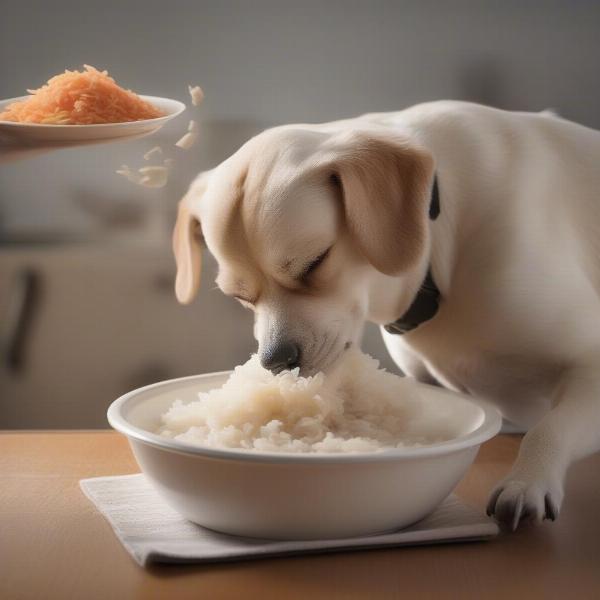If your dog has diarrhea at night only, it can be concerning. While occasional loose stools aren’t unusual, persistent nighttime diarrhea in dogs warrants investigation. This article will explore the potential causes, diagnostic approaches, and solutions to help your furry friend feel better.
Understanding Nighttime Diarrhea in Dogs
Why would a dog have diarrhea only at night? Several factors could be at play, ranging from dietary indiscretions to underlying medical conditions. Pinpointing the cause is crucial for effective treatment. Is it something they ate during the day that takes time to affect their system? Could it be stress related to being left alone at night? Let’s explore these possibilities.
Possible Causes of Nighttime Diarrhea in Dogs
- Dietary Indiscretions: Did your dog sneak a treat or get into the garbage while you were out? Something seemingly harmless could be upsetting their stomach overnight. Food allergies or intolerances can also manifest as nighttime diarrhea.
- Stress and Anxiety: Separation anxiety can lead to various physical symptoms in dogs, including diarrhea. If your dog is anxious when left alone at night, this could be a contributing factor.
- Inflammatory Bowel Disease (IBD): IBD is a chronic condition affecting the digestive tract. Symptoms can vary, and sometimes they are more noticeable at night.
- Parasites: Intestinal parasites like roundworms, hookworms, and giardia can cause diarrhea, which might be more apparent at night due to changes in the dog’s activity levels.
- Infections: Bacterial or viral infections can cause diarrhea.
- Pancreatic Insufficiency: This condition prevents the pancreas from producing enough enzymes to digest food properly, leading to diarrhea and other digestive issues.
- Changes in Routine: Even a slight change in your dog’s routine, like a new bedtime or sleeping arrangement, can sometimes trigger stress and subsequently, diarrhea.
Diagnosing the Cause of Nighttime Diarrhea
If your dog’s diarrhea persists for more than a day or two, it’s important to consult a veterinarian. They will likely perform a physical examination and may recommend further diagnostic tests like fecal analysis, blood tests, or abdominal imaging to determine the underlying cause.
Treatment and Management of Nighttime Diarrhea in Dogs
Treatment depends on the underlying cause. Your vet may recommend:
- Dietary Changes: A bland diet or a prescription food formulated for sensitive stomachs can help soothe the digestive tract.
- Medication: Anti-diarrheal medications, anti-parasitic drugs, or antibiotics may be prescribed depending on the diagnosis.
- Stress Management Techniques: If stress is a factor, creating a calming bedtime routine, using pheromone diffusers, or providing interactive toys can help.
- Probiotics: These can help restore the balance of good bacteria in the gut.
 Dog Eating Bland Diet for Diarrhea
Dog Eating Bland Diet for Diarrhea
What to Do When Your Dog Has Diarrhea at Night
- Monitor your dog closely: Observe the frequency, consistency, and presence of blood or mucus in the stool.
- Withhold food for 12-24 hours: This can help rest the digestive system.
- Provide plenty of fresh water: Diarrhea can lead to dehydration, so ensure your dog has access to clean water at all times.
- Keep the area clean: Clean up any accidents promptly to prevent re-infection and maintain hygiene.
Conclusion
Nighttime diarrhea in dogs can be caused by various factors. While some cases may resolve on their own, persistent or severe diarrhea requires veterinary attention. By working with your veterinarian, you can identify the cause and implement an appropriate treatment plan to help your dog get back to feeling their best. Don’t delay seeking professional advice if you’re concerned about your dog’s health.
FAQ
- How long should I wait before taking my dog to the vet for diarrhea? If the diarrhea persists for more than 24-48 hours, or if your dog exhibits other symptoms like lethargy, vomiting, or loss of appetite, consult your veterinarian immediately.
- Can I give my dog over-the-counter anti-diarrheal medication? It’s best to avoid giving your dog human medications without consulting your veterinarian. Some human medications can be toxic to dogs.
- What are some signs of dehydration in dogs? Signs of dehydration include dry gums, sunken eyes, loss of skin elasticity, and lethargy.
- What should I feed my dog if they have diarrhea? A bland diet of boiled chicken and rice is often recommended for dogs with diarrhea.
- Can stress really cause diarrhea in dogs? Yes, stress and anxiety can affect a dog’s digestive system and lead to diarrhea.
- How can I prevent my dog from getting diarrhea? Preventative measures include feeding a high-quality diet, avoiding table scraps, keeping vaccinations up-to-date, and practicing good hygiene.
- Is nighttime diarrhea more serious than daytime diarrhea? Not necessarily. The timing of the diarrhea is less important than the duration, severity, and accompanying symptoms.
Related articles on ILM Dog:
- pet first aid kit for dogs
- dog has diarrhea at night
- why does my dog have diarrhea only at night
- best flea tablets for dogs
About ILM Dog: ILM Dog is your trusted resource for expert advice on all aspects of dog care, from breed selection and puppy care to senior dog health and training tips. We provide practical, evidence-based information to help you make informed decisions about your dog’s well-being. Our comprehensive guides cover nutrition, grooming, behavior, and much more. Contact us for expert advice: Email: [email protected], Phone: +44 20-3965-8624.